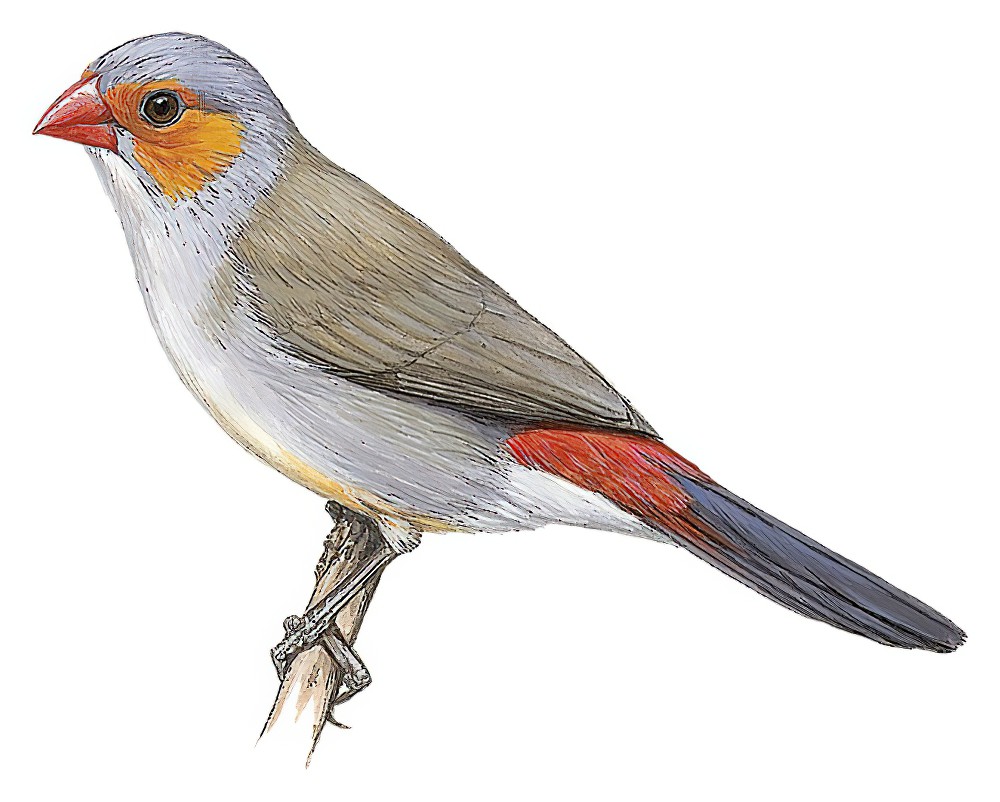Orange-cheeked Waxbill / Estrilda melpoda

Orange-cheeked Waxbill
SCI Name:
Protonym: Fringilla melpoda Nouv.Dict.Hist.Nat. 12 p.177
Taxonomy: Passeriformes / Estrildidae / Estrilda
Taxonomy Code: orcwax
Type Locality: India and west coast of Africa; restricted to Senegal by Neumann, 1932, Anz. Ornith. Ges. Bayern, 2, p. 154.
Author: Vieillot
Publish Year: 1817
IUCN Status: Least Concern
DEFINITIONS
ESTRILDA
(Estrildidae; Ϯ Common Waxbill E. astrild) Specific name Loxia astrild Linnaeus, 1758. It has been suggested that the name derives from a German or Dutch avicultural term for a waxbill. However, an incandescent Reichenbach 1849, wrote that the name Estrelda, from astrild, was neither Latin nor English, nor anything else, and castigated the linguistically proficient authors who foisted it on the scientific community (“Der Name Estrelda, aus Astrild gemacht, ist weder lateinisch noch englisch, noch sonst etwas; man könnte ihn kaum deutsch-englisch nennen und muss erstauen, wie ein paar sprachkundige Männer ihn in die wissenschaft aufzunehmen vorsuchten”); "ESTRILDA. Rostrum breve, conicum, immarginatum. Alæ breves, rotundatæ; remige 1ma spuria, minuta, 3tia, 4ta, et 5ta æqualibus, longissimis. Cauda subelongata, gradata. ... Type. Loxia astrild. Linn. This, and the preceding genus [Amadina], appear strictly confined to the warm regions of the old world; and will detach a vast number of species from the Loxiæ and Fringillæ of Linnæus. I have endeavoured in vain to reconcile the different groups of these birds proposed by Brisson, Cuvier, and Vieillot, with any thing like a geographic or a natural arrangement; and this must be my apology for not adopting either their names or characters; the first would lead to much confusion, while the latter are artificial. The minute spurious quill, (which I have termed, for the sake of uniformity, the first), seems to be an unerring indication of an African or Asiatic origin; and I find the same character in all those I have seen from New Holland." (Swainson 1827); "Estrilda Swainson, Zool. Journ. iii, p. 349, 1827. Type by original designation, Loxia astrild Linn." (W. Sclater, 1930, Syst. Av. Aethiop., II, p. 794).
Var. Astrilda, Estrelda, Estrila.
Synon. Brunhilda, Glaucestrilda, Habropyga, Haplopyga, Krimhilda, Melpoda, Senegalus.
melpoda
Gr. μελπωδος melpōdos singing songs < μελπω melpō to sing and dance.
● ex “Bengali à joues oranges” of Vieillot 1805 (Estrilda).
Melpoda
(syn. Estrilda Ϯ Orange-cheeked Waxbill E. melpoda) Gr. μελπωδος melpōdos singing songs < μελπω melpō to sing and dance (cf. specific name Fringilla melpoda Vieillot, 1817); "XVII. Melpoda RCHB. Orangenwange. ... Von Astrilda durch kürzeren Schnabel, anderes Schwingenverhältniss, breite Schwanzfedern, Mangel aller Wellenzeichnung und Wangenfleck verschieden. ... 62-64. M. lippa (Fring. - LICHTENST. Mus. Ber.) RCHB. Bengali à joues orangées VIEILLOT Ois. chant. 26. pl. VII. ... Das niedliche Vögelchen ist ausserordentlich munter, flattert sehr gern herum und lässt einen zarten, lieblichen Gesang hören" (Reichenbach 1862).
UPPERCASE: current genus
Uppercase first letter: generic synonym
● and ● See: generic homonyms
lowercase: species and subspecies
●: early names, variants, mispellings
‡: extinct
†: type species
Gr.: ancient Greek
L.: Latin
<: derived from
syn: synonym of
/: separates historical and modern geographic names
ex: based on
TL: type locality
OD: original diagnosis (genus) or original description (species)












